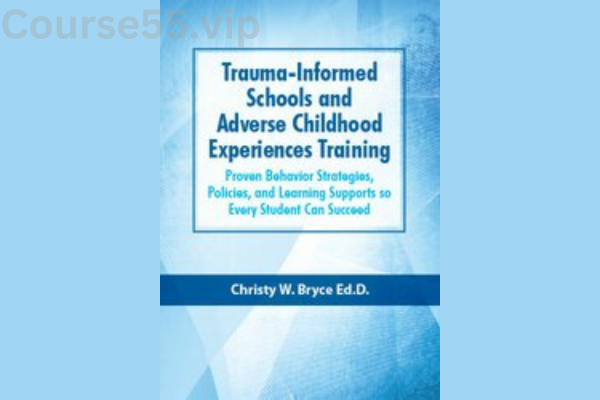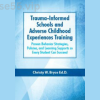Trauma-Informed Schools and Adverse Childhood Experiences Training By Christy Bryce – PESI
$249.00 Original price was: $249.00.$23.10Current price is: $23.10.
Trauma-Informed Schools and Adverse Childhood Experiences Training by Christy Bryce – Digital Download!

Trauma-Informed Schools and Adverse Childhood Experiences Training By Christy Bryce – PESI
Overview

Trauma-Informed Approaches for Schools: Addressing Adverse Childhood Experiences and Supporting Student Well-Being
Understanding trauma’s effect on children is crucial in today’s educational environment. With a significant number of children facing adverse childhood experiences (ACEs), educators must be equipped with the necessary knowledge and tools. Dr. Christy Bryce, Ed.D., leads the Trauma-Informed Schools and Adverse Childhood Experiences Training to help educators and clinicians address and respond to trauma effectively. Drawing from over two decades of experience in education, Dr. Bryce integrates her background as a school psychologist and special education teacher to offer in-depth insights. This training moves beyond traditional methods, aiming to create safer, more supportive learning spaces for students.
Exploring the Impact of Trauma on Children and Adolescents
The primary objective of Dr. Bryce’s training is to increase awareness of how trauma affects children and adolescents. Trauma can influence mental health, behavior, and academic performance, making it essential for educators to recognize early indicators of trauma. Trauma may appear in various forms, including anxiety, withdrawal, or aggression. Educators must understand these signs to intervene promptly and effectively.
Key Components of the Trauma-Informed Training
Throughout the training, participants are introduced to vital components that foster psychological safety and resilience in students. These elements include:
-
Recognizing Early Mental Health Issues: Educators learn how to identify signs of depression and suicidality, which are critical for early intervention.
-
Developing Supportive Classroom Strategies: The training focuses on building an inclusive, welcoming classroom where students can express themselves freely.
-
Implementing Trauma-Sensitive Interventions: Practical techniques are provided to help educators address trauma’s impact on learning.
Dr. Bryce’s curriculum aims to engage educators actively in the process, promoting collaboration and shared responsibility for the well-being of students.
Practical Strategies for Educators in Trauma-Informed Classrooms
A standout feature of the training is the emphasis on actionable strategies that can be immediately applied in classrooms. Key strategies include:
-
Mindfulness Exercises: These practices help students manage their emotions, contributing to a more peaceful classroom environment.
-
Co-Regulation Methods: Educators are taught how to help students regulate their emotions, providing vital support during difficult moments.
-
Differentiated Instruction: Educators learn to adjust their teaching methods to accommodate the diverse needs of students, especially those affected by trauma.
-
Behavioral Interventions: Tailored interventions are introduced to address disruptive behaviors without stigmatizing affected students.
These strategies are grounded in research and best practices, ensuring educators have the tools to create inclusive, trauma-sensitive environments.
Navigating Challenges and Overcoming Barriers in Trauma-Informed Practices
The training also addresses the challenges educators may face when implementing trauma-informed practices. Dr. Bryce identifies key limitations, such as:
-
Resource Limitations: Many schools lack the resources to implement comprehensive trauma-informed programs, which can hinder their effectiveness.
-
Ongoing Professional Development: Dr. Bryce emphasizes the importance of continuous training, as trauma-informed education is an evolving field that requires consistent updates and support.
-
Systemic Obstacles: Broader systemic issues within educational institutions can impede the success of trauma-informed strategies, highlighting the need for advocacy and institutional change.
By recognizing these challenges, educators are better prepared to address the complexities of trauma-informed education and ensure that trauma-sensitive practices are sustained.
Evidence-Based Approaches for Emotional and Academic Support
Dr. Bryce’s training incorporates evidence-based practices that support both the emotional and academic growth of students. Research has shown that schools with trauma-informed practices experience improvements in attendance, grades, and student behavior.
Research Insights
Some of the key findings supporting the adoption of trauma-informed principles in schools include:
-
A study published in the American Journal of Public Health revealed that trauma-informed practices can reduce behavioral problems and improve school climate.
-
Research from the Journal of Adolescent Health shows that students exposed to ACEs perform better in environments that acknowledge and address trauma’s effects.
These insights validate the effectiveness of trauma-informed practices, demonstrating their potential to improve educational outcomes and overall student well-being.
Conclusion: Fostering Safe, Inclusive, and Supportive Schools
The Trauma-Informed Schools and Adverse Childhood Experiences Training led by Christy Bryce is more than just a professional development opportunity—it’s a movement towards creating safe, inclusive, and supportive environments for all students. By equipping educators with the necessary tools and understanding of trauma, Dr. Bryce’s training ensures that educators are not only meeting the immediate needs of students but also contributing to a broader shift in how schools address childhood trauma. Graduates of this program emerge with renewed purpose and a deeper commitment to making a difference in the lives of students affected by trauma. The insights gained from this training not only benefit students but also influence broader public health and well-being initiatives, advocating for systemic changes in how trauma is addressed in society.
Frequently Asked Questions:
Business Model Innovation: We operate a group buying strategy, allowing participants to share costs and access popular courses at reduced prices. This model benefits individuals with limited financial resources, despite concerns from content creators about distribution methods.
Legal Considerations: The legality of our operations involves complex issues. Although we don’t have explicit permission from course creators to resell their content, there are no specific resale restrictions stated at the time of purchase. This ambiguity creates an opportunity for us to provide affordable educational resources.
Quality Control: We ensure that all course materials purchased are identical to those offered directly by the creators. However, it’s important to understand that we are not official providers. As such, our offerings do not include:
– Live coaching calls or sessions with the course author.
– Access to exclusive author-controlled groups or portals.
– Membership in private forums.
– Direct email support from the author or their team.
We aim to reduce the cost barrier in education by offering these courses independently, without the premium services available through official channels. We appreciate your understanding of our unique approach.
Be the first to review “Trauma-Informed Schools and Adverse Childhood Experiences Training By Christy Bryce – PESI” Cancel reply
You must be logged in to post a review.

 High Probability Continuation and Reversal Patterns
High Probability Continuation and Reversal Patterns 















Reviews
There are no reviews yet.